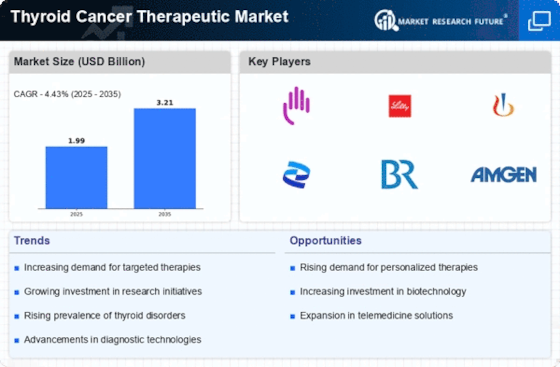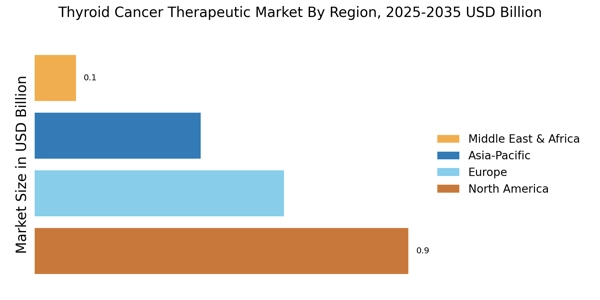Increased Awareness and Education
The Thyroid Cancer Therapeutic Market is experiencing a positive impact from increased awareness and education regarding thyroid cancer. Public health campaigns and educational initiatives are informing individuals about the risk factors, symptoms, and the importance of early detection. This heightened awareness is leading to more individuals seeking medical evaluations for thyroid-related issues, resulting in a higher diagnosis rate of thyroid cancer. As patients become more informed, they are more likely to advocate for appropriate treatment options, thereby driving demand for therapeutic solutions. Additionally, healthcare providers are becoming more knowledgeable about the latest treatment advancements, which enhances their ability to offer effective therapies. This collective effort to educate the public and healthcare professionals is expected to sustain growth in the Thyroid Cancer Therapeutic Market.
Rising Incidence of Thyroid Cancer
The Thyroid Cancer Therapeutic Market is experiencing growth due to the increasing incidence of thyroid cancer. Recent statistics indicate that thyroid cancer cases have been on the rise, with an estimated 54,540 new cases diagnosed in the United States alone in 2023. This upward trend is likely to continue, prompting a greater demand for effective therapeutic options. As awareness of thyroid cancer increases, more individuals are seeking medical attention, leading to earlier diagnoses and treatment interventions. Consequently, pharmaceutical companies are investing in research and development to create innovative therapies tailored to this growing patient population. The rising incidence not only highlights the need for effective treatments but also drives the market towards more advanced therapeutic solutions.
Advancements in Diagnostic Techniques
The Thyroid Cancer Therapeutic Market is significantly influenced by advancements in diagnostic techniques. Enhanced imaging technologies, such as high-resolution ultrasound and molecular testing, have improved the accuracy of thyroid cancer diagnoses. These innovations enable healthcare providers to identify thyroid nodules and differentiate between benign and malignant conditions more effectively. As a result, earlier detection of thyroid cancer is becoming commonplace, which in turn increases the demand for therapeutic interventions. The integration of these advanced diagnostic tools into clinical practice is likely to lead to a more proactive approach in managing thyroid cancer, thereby expanding the therapeutic market. Furthermore, the development of biomarkers for thyroid cancer is expected to facilitate personalized treatment strategies, further propelling market growth.
Growing Investment in Cancer Research
The Thyroid Cancer Therapeutic Market is benefiting from a surge in investment directed towards cancer research. Governments and private organizations are allocating substantial funds to explore novel treatment modalities, including targeted therapies and immunotherapies. For instance, funding for cancer research in the United States reached approximately 6.5 billion USD in 2023, reflecting a commitment to advancing therapeutic options for various cancers, including thyroid cancer. This influx of capital is fostering innovation and accelerating the development of new drugs and treatment protocols. As research progresses, the Thyroid Cancer Therapeutic Market is likely to see the introduction of more effective therapies, which could improve patient outcomes and survival rates. The emphasis on research is crucial for addressing the unmet needs within the thyroid cancer treatment landscape.
Regulatory Support for Innovative Therapies
The Thyroid Cancer Therapeutic Market is positively influenced by regulatory support for innovative therapies. Regulatory agencies are increasingly recognizing the need for expedited approval processes for new cancer treatments, particularly those that demonstrate significant efficacy and safety profiles. Initiatives such as the FDA's Breakthrough Therapy Designation are designed to facilitate the development and review of promising therapies for serious conditions, including thyroid cancer. This regulatory environment encourages pharmaceutical companies to invest in research and development, knowing that there is a pathway for quicker market access. As a result, the Thyroid Cancer Therapeutic Market is likely to witness a faster introduction of novel therapies, which could enhance treatment options for patients and improve overall outcomes.

















